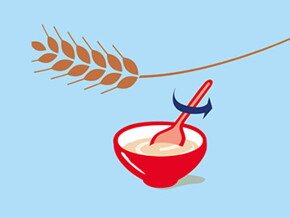
Protein Requirement For Infants
Protein Intake For Toddlers
IMPORTANT NOTICE: The World Health Organization (WHO) recommends exclusive breastfeeding for the first 6 months and continued breastfeeding for as long as possible. Growing up milks are formulated to meet nutrition needs of healthy young children older than 1 year and should not be fed to infants.
Your child’s diet contains three essential macronutrients to stimulate his growth and development, namely: carbohydrates, fats and proteins.
Carbohydrates provide his body with energy and regulate his blood glucose level. Fats stimulate his brain and preserve his health with their anti-oxidant characteristics. Proteins play a vital role in strengthening his immunity, building and developing his muscles and cells.
Among these three nutrients, your greatest fear is certainly protein deficiency, knowing that your toddler receiving his daily need of protein is very easy as long as he’s consuming a healthy, balanced and diversified diet.
As for the daily allowance of protein, it varies pursuant to child’s age, weight and activity. The perfect way to calculate same focuses on providing a child’s body with about 1.1g of protein for each kilogram of his weight, i.e. equal to 5-10% of his daily caloric intake.
In order to provide your child with his daily-required protein, we recommend you to follow these simple and delicious ideas:
- Serve your child milk with cereals every morning, knowing that each cup of milk contains 8g of protein.
- Give your child yogurt as a snack along with fruits, where 240ml of yogurt contains 14g of protein.
- Make your child a delicious sandwich with natural peanut butter (unless he’s allergic toward it of course) since every 2 spoons contain 8g of protein.
- Give your child a sandwich of scrambled egg in pita bread, for one egg contains 7g of protein.
- Try to add tofu to your child’s banana and chocolate shake, where every half cup of it contains 8g of protein.
Apart from these tips and ideas, do not hesitate to enrich your toddler’s diet with other protein sources, mainly meat, fish, chicken, cheese and broccoli, and make sure his protein daily intake doesn’t exceed the recommended levels for his age, so he won’t experience the negative side effects of too much protein, especially: obesity (caused by excess protein conversion into fats), dehydration (caused by kidneys flushing out excess of protein with water), calcium deficiency, kidney problems, digestive disorders, etc.
Read More: Child Protein Deficiency




















